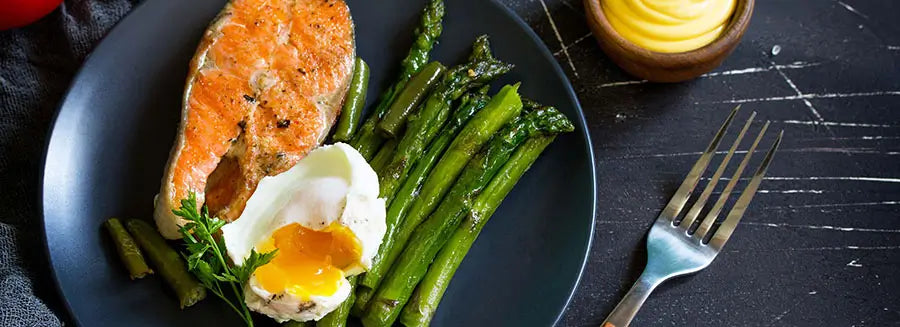
by Mia Rigden, board-certified nutritionist, classically trained chef
It may just be my hungry gray matter talking, but the brain is just about the most important organ in the body. This complex network of neurons acts like a control system for everything from emotions to learning, memory, cognition to motor control, sensory information (touch, sight, smell, sound), body temperature, hormones, blood pressure, decision making, and who we are as humans. You can think about eating for brain health as eating to form and preserve our identities.
Nutrition protects our brain through all life stages. From the womb through childhood and adolescence, the brain needs nutrients to grow and develop. Throughout our adult lives and into our later years, eating for brain health helps to protect our craniums.
Among the most critical for brain growth, development, and function are the following seven key nutrients.
Healthy Fats
Fats help support brain function and structure. They have even been found to boost mood and reduce cognitive impairment. Focus on high-quality fat sources like avocado, nuts, seeds, eggs, olive oil and fatty fish. Omega 3 fatty acids, found in certain fish (use the acronym SMASH: salmon, mackerel, anchovies, sardines, and herring), eggs, avocado, walnuts, flax and chia seeds are particularly beneficial for brain function and cognitive health.
How to eat healthy fats for brain health
Choose a fat source for every meal, whether it’s avocado, olive oil, nuts, or seeds. Try to eat fatty fish a few times a week.
Antioxidants
Antioxidants are widely found in plant foods, including fruits, vegetables, nuts, and seeds. They protect the brain from harmful oxidative stress. Vitamin E is a particularly potent antioxidant that can protect the cells of the brain from oxidative damage. It’s abundant in nuts and seeds, like almonds, peanuts, and pistachios; fruits like avocado, blackberry, and mango; vegetables including broccoli, red peppers, and spinach; and even seafood, like salmon, lobster, and cod.
How to eat antioxidants for brain health
Eat a variety of plant-based foods in different colors. I normally recommend trying 20 different fruits and vegetables per week.
B Vitamins: B6, B12, and folate (B9)
B vitamins are essential for the production of neurotransmitters (messengers that help our cells communicate) like serotonin and dopamine, which regulate mood and cognitive function. B vitamins are widely found in animal protein, as well as some leafy greens and legumes. In particular, B6, B12, and folate (B9) are critical for brain health.
How to eat B vitamins for brain health
Prioritize eating proteins from both plant and animal sources. Incorporate leafy greens daily. If animal protein is not an option, seriously consider a B Complex supplement.
Choline
Choline is an essential nutrient abundant in egg yolks, liver, chicken, dairy products, legumes, and cruciferous vegetables (like broccoli, cabbage, cauliflower, and kale). It is the precursor to the neurotransmitter acetylcholine which plays a role in memory, learning, attention, and muscle control.
How to eat choline for brain health
Eat eggs regularly, if you can tolerate them. Incorporate cruciferous vegetables into your diet. Check your supplement labels as well. If you’re a LivOn Labs customer, you’ll find “Good Source of Choline” right on the carton.
Vitamin D
Higher levels of vitamin D have been associated with better cognitive function and memory, improved mood and mental health, and slower rates of cognitive decline. In fact, there are vitamin D receptors all over the brain. Increase your vitamin D levels through sun exposure, by consuming seafood and mushrooms, or taking a supplement if necessary.
How to raise Vitamin D levels for brain health
Get your vitamin D levels checked annually. Supplement, if necessary, and practice safe sun exposure.
Minerals, including iron, magnesium, and zinc
Iron creates hemoglobin, which carries oxygen to the brain, and is involved in synthesizing neurotransmitters like serotonin and dopamine. Magnesium is critical for the parts of the brain responsible for learning, memory, and relaxation. One study even found that people who consumed more than 550 mg of magnesium a day had higher brain volumes! Zinc works with the hippocampus region of the brain to support learning and memory as well.
How to eat zinc, magnesium, and iron for brain health
Meat is the best source of iron. Get your iron levels checked regularly if you don’t eat animal protein, and consider supplementation. If you rely on iron from plant sources, pair with with foods rich in Vitamin C or a Vitamin C supplement to support absorption. Magnesium is a common nutrient deficiency: To supplement magnesium specifically for brain health, try one that contains magnesium l-threonate. To reach proper zinc levels, make sure your diet includes ample protein, including seafood, meat, legumes, and nuts.
Curcumin
Curcumin is the active ingredient in turmeric. Its antioxidant properties support overall brain health as well as important neurotransmitters like serotonin and dopamine.
How to eat curcumin for brain health
Spice your food! Try a curry, turmeric-marinated chicken and fish, or a dash of turmeric in a smoothie.
Eating for brain health is easier than you may think
The good news about eating for brain health is consuming these nutrients support your entire body. Eating for brain health is eating for total body health.
Mia Rigden is a Los Angeles-based board certified nutritionist, trained chef, and the author of The Well Journal (2020) and Foodwise (2023), a comprehensive, encouraging guide to healthy eating with 100 original, nutritionally-balanced and flavor-enriching recipes. Learn more about working with Mia on her website, check out an online course, and follow on Instagram @mia_rigden for science-backed, practical nutrition advice.

